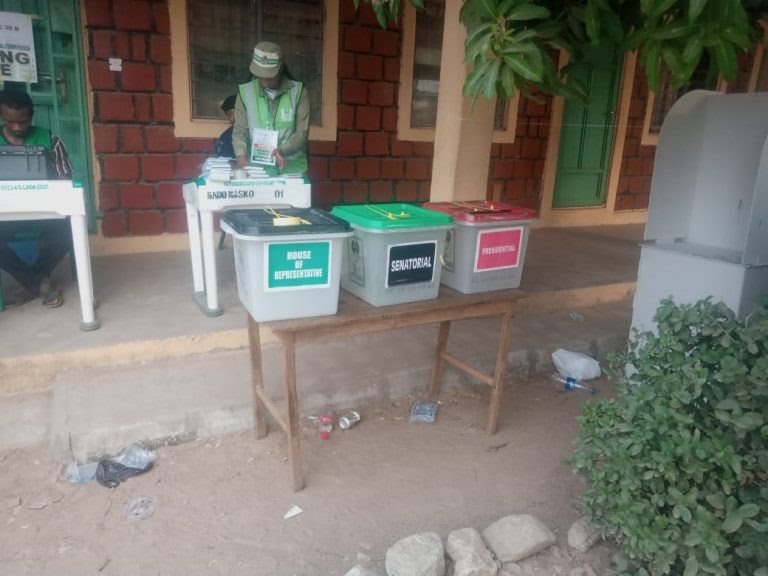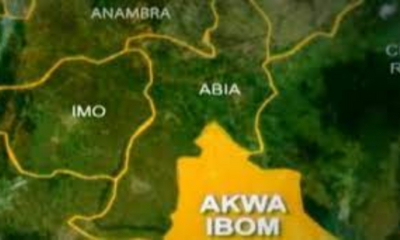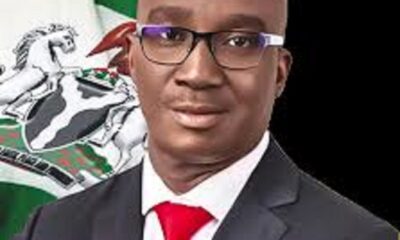Politics
Fake News, Misinformation Threaten Credible Polls – INEC

The Independent National Electoral Commission (INEC) has again decried the rising cases of fake news and misinformation.
The electoral umpire ‘opened the book of lamentation’ on Monday at a two-day capacity-building workshop for members of the INEC Press Corps in Akwanga, Nasarawa State.
Ahead of the November 11 governorship in Bayelsa, Kogi, and Imo States, INEC declared that fake news was capable of having a negative impact on the management of elections and thus should be done away with.
National Commissioner and Member, Information and Voter Education Committee, INEC, Prof. Kunle Ajayi, stated the umpire’s position at the workshop themed, “Ethical, Safety Practices and Critical Issues Relating to the Kogi, Imo, and Bayelsa Governorship Elections”.
The workshop held with sponsorship considerations from a not-for-profit organisation, the Development Alternatives Incorporated (DAI).
Prof Ayai maintained that the INEC’s stance against hate speech and misinformation stems from its experience from previous elections, especially the 2023 general elections.
He said, “I would like at this juncture, to draw the attention of the media to a crucial issue that poses a serious threat to the election process in Nigeria. That is the issue of fake news.
“The Commission’s distasteful experience with fake news in the 2023 General Elections has shown that, if not nipped in the bud, fake news can become the bane of election management in Nigeria.
“The alarming prevalence of misinformation, ‘fake news’, hate speech, and the weaponization of disinformation has become very worrisome to the Commission.”
According to the National Commissioner, elections-related disinformation has become a major strategy in the hands of nefarious individuals and groups within Nigeria’s political space to manipulate the general public to their advantage, regardless of the consequential effect such propaganda may have on the peace and stability of the electoral process and the country at large.
He highlighted that “Disinformation is used to provoke religious, political, and tribal sentiments in an already polarized society such as ours, especially, during election season, which is often the leading cause of electoral violence and uprisings.
“Election-related disinformation has become a major strategy used by nefarious individuals and groups in the political space to manipulate the general public to their advantage, regardless of the consequential effect such propaganda may have on the peace and stability of the electoral process and the country at large.”
Team Lead, DAI, Rudolf Elbling described the media as an essential part of any democracy, adding that a democratic election without the media is impossible, because they are the crucial watchdog to democratic elections, safeguarding the transparency of the process.
Elbling stated, “Election without the media is not complete. The reportage of the media must be correct and factual. Free media is the oxygen for democracy. Journalists must maintain a high level of professionalism.”
Politics
No Political Gang-Up Can Stop Tinubu’s Re-Election In 2027 – APC Chieftain

A chieftain of the All Progressives Congress (APC), Olatunbosun Oyintiloye, has dismissed fears that recent defections from the ruling party will affect President Bola Ahmed Tinubu’s chances of securing re-election in 2027.
Speaking in Osogbo on Sunday, Oyintiloye described the ongoing political realignments as inconsequential, insisting that Tinubu has a “winning strategy” to counter any opposition at the right time.
His comments come amid reports that former Kaduna State Governor, Nasir El-Rufai, has defected to the Social Democratic Party (SDP) and is reaching out to former APC stalwarts, including Rauf Aregbesola, to join him.
READ ALSO: El-Rufai Abandons APC, Says Party No Longer Represents Progressives
Despite this, Oyintiloye maintained that defections are a normal part of politics and would not derail the president’s re-election bid.
“Take it or leave it, no amount of political gang-up can stop the re-election of President Tinubu in 2027. Those who are gathering against him should study the kind of person he is,” Oyintiloye said.
He further argued that Tinubu’s achievements, political acumen, and goodwill across the country would secure him victory in the next election. According to him, the president is making deliberate efforts to put Nigeria on the path of greatness, and these efforts are already yielding positive results.
“The president will succeed, and his political enemies will soon realise their mistake in opposing him,” he added.
While expressing confidence in Tinubu’s chances, Oyintiloye urged the president to intensify public engagement and sensitisation efforts to showcase his administration’s achievements and future projections.
With political tensions rising ahead of the 2027 elections, Tinubu’s camp remains optimistic about his chances, despite defections and emerging opposition alliances.
Politics
Edo Women Protest Against Natasha Over Akpabio
Party loyalty and personal leanings on the political gbas-gbos rocking the Nigerian Senate have echoed in Edo State with women groups moving publicly against Senator Natasha Akpoti-Uduaghan.
These turn of events, which appeared to have the blessing of the Edo State Government was detailed in a government house statement in Benin City, under the signature of the Chief Press Secretary to the Governor, Fred Itua.
According to the statement, the All Progressives Congress (APC) Senatorial Woman Leader for Edo South, Hon. Barr. Itohan Osahon, led protest demanding that Sen Akpoti-Uduaghan should apologise to Senate President Godswill Akpabio.
ALSO READ: Reps Approve Tinubu’s Tax Reform Bills, Senate To Follow
Itua made clear on which side the Edo State was standing, when the Secretary to the State Government, Barr. Musa Ikhilor, received the pro-Akpabio demonstrators, on behalf of the governor, Senator Monday Okpebholo.
He cited the President, Senior Citizens of Edo State, Rosemary Elawure, as having made it clear that the women embarked on the peaceful protest in support of Senate President Godswill Akpabio.
The statement reads, “A group of concerned women from Edo State has called on Senator representing Kogi Central, Natasha Akpoti-Uduaghan to humble herself and apologize to Senate President Godswill Akpabio and Nigerians for dragging the name of the nation in the mud.
The women gave the charge during a peaceful protest to the Edo State Government House.
Led by the All Progressives Congress (APC) Senatorial Woman Leader for Edo South, Hon. Barr. Itohan Osahon, the women were received by the Secretary to the State Government, Barr. Musa Ikhilor on behalf of the governor, Senator Monday Okpebholo who was out of the State on an official assignment.
Speaking, Osahon said: “We are concerned women of Edo State and we are not comfortable with what is going on at the red chamber. Natasha is not the only woman in the Senate and the Senate is not about sexual harassment.
“She was suspended because she violated the rules of the Senate and she is manipulating the whole issue against the Senate President, Sen. Godswill Akpabio. Senator Natasha has been suspended for six months for disobeying the Senate Rules, not for sexual harassment.
“We don’t want her to abuse the opportunity given to her to serve her people. Our First Lady was once a senator and was there for years and such issue was not experienced. We have had many women in the Senate and House of Representatives and we have not had issues like this.
“Traveling all around the world, disgracing the country, making us the laughing stock and making a whole lot of noise about the issue. She should just apologize to the Senate. Edo State women are women who respect tradition and respect our men. She should not drag us to the mud.
“Our demand is that Natasha should be called to order and sentiments should not come to play and she should respect the rules of the Senate.”
The President, Senior Citizens of Edo State, Mrs. Rosemary Elawure said the women embarked on the peaceful protest in support of Senate President Godswill Akpabio.
She said Sen. Natasha lied against Senator Akpabio and that she was not the only senator whose seat was changed in the red chambers.
“Senior citizens don’t support things that will not bring progress and development to the country. Edo women are in support of the Senate President who has a very beautiful and intelligent wife who is humble and respectful. We urge Senator Natasha to be respectful and obey the rules of the Senate,” she counselled.
The women asked her to apologize to the Senate, House of Representatives as well as State Houses of Assembly in the country.
Receiving the women, Barr. Ikhilor commended them for a peaceful protest and expressing themselves freely, noting that women are very big stakeholders in Edo State.
He noted that the National Assembly is for all Nigerians and thanked the women for adding their voices to the issues concerning Sen. Natasha and the President of the Senate.
“You are here to make a very strong point regarding what is going on as it is now disturbing. It is wrong for facts to be distorted and manipulated. Nigerians are beginning to become conscious.
“Nigerians are aware of what happened in the Senate. The issue is all about the rules and regulations and anyone who disobeys them should face the consequences. Women are fighting for bigger issues facing them and Sen. Natasha can’t serve as the stumbling block stopping women from progressing.
“Sen. Akpabio has made a distinguished career in public service and we have confidence in him and his ability to manage the red chamber. The Senate is not a place for content creation and distractions but for serious minded people. Information should not be manipulated or distorted as Nigerians know what is happening in the Senate and can’t be deceived again.
“The governor is a senator and knows what happened in the chamber. He has confidence in the Senate President Godswill Akpabio. He will carry this message to different levels as we all have to protect our institutions.”
Politics
Reps Approve Tinubu’s Tax Reform Bills, Senate To Follow

The House of Representatives has adopted the report on the four tax reform bills of the President Bola Ahmend Tinubu administration.
The house made the adoption on Thursday at plenary in Abuja.
Having scaled the lower house, the tax reform bills now await the endorsement of the Senate.
ALSO READ: Economic Reforms Aim To Protect Nigeria’s Future – Tinubu
Notably, the adopted bills include the Nigerian Tax Bill, the Tax Administration Bill, the Revenue Tax Board Bill, and the Nigerian Revenue Service Establishment Bill.
The chairman of the House of Representatives Committee on Finance, Hon James Abiodun Faleke, said, “These bills underwent three full days of public hearings, with input from over 80 key stakeholders. Afterwards, we held an eight-day retreat to debate each clause.”
He assured Nigerians that the tax reform bills would produce widely acceptable laws.
“I am glad that House members recognised our thorough work and approved all our recommendations,” Faleke said.
He thanked fellow lawmakers and the House leadership for entrusting his committee with processing the tax bills and presenting them for consideration.
He commended President Tinubu for prioritising tax law reforms, noting that some existing tax laws date back to 1959.
“We cannot continue using outdated tax laws that no longer meet our business, survival, and revenue needs,” he stressed.
On his part, the Deputy Committee Chairman, Hon Saidu Abdullahi (APC-Niger), noted that no bill in the 10th Assembly had generated as much debate as the tax reform bills.
He praised Speaker Tajudeen Abbas for fostering consensus among stakeholders, ensuring broad-based input into the legislative process.
Hon Abdullahi highlighted that representatives from all geopolitical zones and regional thought leaders were involved, easing public concerns.
“The committee’s recommendations reflect the contributions of various stakeholders.
“These were never seen as perfect documents. The Executive made proposals, and the public hearing allowed Nigerians to refine them. Lawmakers have now endorsed the final version,” he added.
In the same vein, Hon Ikeagwuonu Ugochinyere (PDP-Imo) described the process as transparent, with consultants and the Executive making adjustments to reflect public interest.
“In spite of being in the opposition, we are proud of this historic moment. It will expand the tax net and increase government revenue.
“This reform will enhance tax collection efficiency while protecting small businesses. That is why we worked together to ensure its passage,” Hon Ugochinyere said.
In the views of Hon Benson Babajimi (APC-Lagos), all stakeholder concerns, including inheritance tax, derivation, and VAT, were carefully considered.
“This is a great day for Nigeria. The House has approved the necessary reforms, and we now await Senate concurrence,” he said.

























